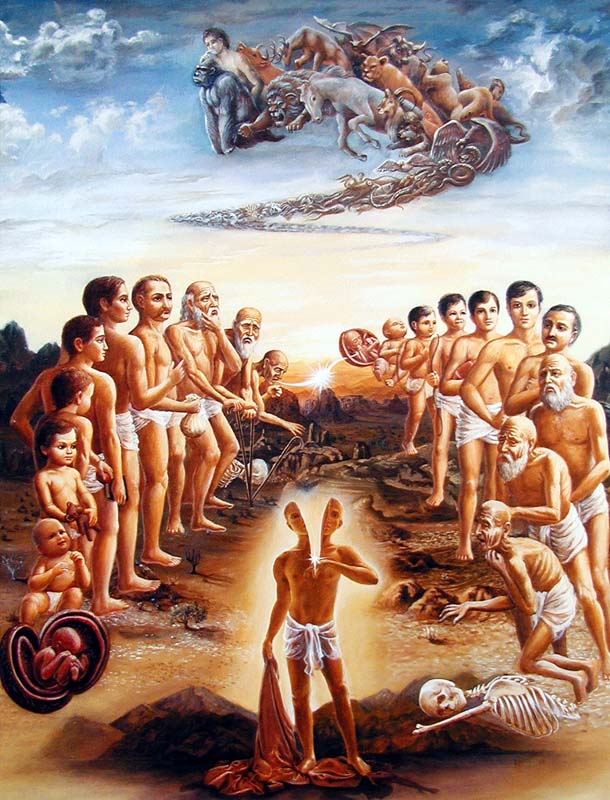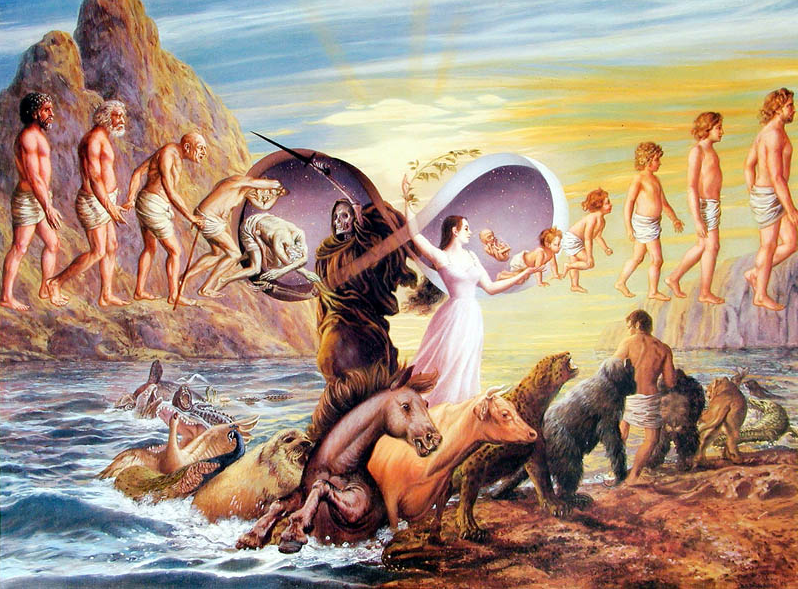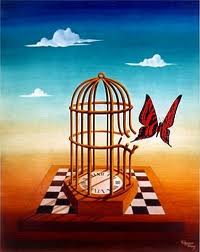The Law Of Karma
Karma means not only action, but also the result of an action. The consequence of an action is really not a separate thing. It is a part of the action, and cannot be divided from it. Breathing, thinking, talking, seeing, hearing, eating, etc., are Karmas. Thinking is mental Karma. Karma is the sum total of our acts both in the present life and in the preceding births.
Any deed, any thought that causes an effect, is called a Karma. The Law of Karma means the law of causation. Wherever there is a cause, there an effect must be produced. A seed is a cause for the tree which is the effect. The tree produces seeds and becomes the cause for the seeds.
How Karma Is Fashioned
Man is threefold in his nature. He consists of Ichha (desire, feeling), Jnana (knowing) and Kriya (willing). These three fashion his Karma. He knows objects like chair, tree, etc. He feels joy and sorrow. He wills to do this, or not to do that.
Behind the action, there are desire and thought. A desire for an object arises in the mind. Then you think how to get it. Then you exert to possess it. Desire, thought and action always go together. They are the three threads, as it were, that are twisted into the cord of Karma.
Desire produces Karma. You work and exert to acquire the objects of your desire. Karma produces its fruits as pain or pleasure. You will have to take births after births to reap the fruits of your Karmas. This is the Law of Karma.
The Working Of The Law
The Law of Karma is one of the fundamental doctrines not only in Hinduism, but also in Buddhism, and in Jainism. As a man sows, so he shall reap. This is the Law of Karma. If you do an evil action, you must suffer for it. If you do a good action, you must get happiness. There is no power on this earth which can stop the actions from yielding their fruits. Every thought, every word, every deed is, as it were, weighed in the scales of eternal, divine Justice. The Law of Karma is inexorable.
Things do not happen in this universe by accident or chance in a disorderly manner. They happen in regular succession. They follow one another in a regular order. There is a certain definite connection between what is being done now by you, and what will happen in the future.
Every action produces a threefold effect. It gives you an appropriate reward or fruit. It also affects your character. It leaves behind an impression in your mind. This impression will urge you to repeat the act again. The impression will assume the form of a thought-wave in the mind on account of a stimulus, either external or internal. An action produces an effect in the world also.


As You Sow, So You Reap
If you put a seed in the earth, it sends up a little stem. Then leaves come out of the stem. Then come flowers and fruits. There are seeds again in the fruits. Mango seed only produces mango tree. If you sow rice, you cannot expect a crop of wheat. The same sort of seed produces the same kind of plant. A human being alone is born from the womb of a woman, a horse from a horse and a dog from a dog. Similarly, if you sow the seed of an evil action, you will reap a harvest of pain and suffering. If you sow the seed of a virtuous action, you will reap a harvest of pleasure. This is the Law of Karma.
Whatever you sow by your actions come back to you. If you make others happy through service, charity and kind acts, you sow happiness like a seed; and it will give you the fruit of happiness. If you make others unhappy through harsh words, insult, ill-treatment, cruel acts, oppression, etc., you sow unhappiness like a seed; and it will give you the fruit of pain, suffering, misery and unhappiness. This is the immutable Law of Karma.
Your actions in the past are responsible for your present condition. Your present actions will shape or mould your future. There is nothing chaotic or capricious in this world. You become good by your good actions, and bad by your evil actions.
The Three Kinds Of Karma
Sanchita, Prarabdha and Agami
Karma is of three kinds, viz., Sanchita (accumulated works), Prarabdha (fructifying works) and Kriyamana or Agami (current works). Sanchita is all the accumulated Karmas of the past. Part of it is seen in the character of man, in his tendencies and aptitudes, capacities, inclinations and desires, etc. Tendencies come from this. Prarabdha is that portion of the past Karma which is responsible for the present body. That portion of the Sanchita Karma which influences human life in the present incarnation is called Prarabdha. It is ripe for reaping. It cannot be avoided or changed. It is only exhausted by being experienced. You pay your past debts. Prarabdha Karma is that which has begun and is actually bearing fruit. It is selected out of the mass of the Sanchita Karma. Kriyamana is that Karma which is now being made for the future. It is also called Agami or Vartamana.
In Vedantic literature, there is a beautiful analogy. The bowman has already sent an arrow and it has left his hands. He cannot recall it. He is about to shoot another arrow. The bundle of arrows in the quiver on his back is the Sanchita; the arrow he has shot is Prarabdha; and the arrow which he is about to shoot from his bow is Agami. Of these, he has perfect control over the Sanchita and the Agami, but he must surely work out his Prarabdha. The past which has begun to take effect he has to experience.
There is another beautiful analogy also. The granary represents the Sanchita Karma; that portion taken from the granary and put in the shop for future daily sale corresponds to Agami; that which is sold daily represents Prarabdha.
The whole lot of Sanchita Karma is destroyed by attaining Knowledge of Brahman or the Eternal. It can be greatly modified by entertaining lofty, divine thoughts, and doing virtuous actions. Agami Karma can be destroyed by expiatory rites or Prayaschitta; and by removing the idea of agency through Nimitta Bhava (attitude that one is an instrument in the hands of God) and Sakshi Bhava (attitude that one is silent witness of the actions of the senses and of the mind).

The Supremacy Of Free-Will
You are the master of your own fate. You are the architect of your own fortune. You are responsible for what you suffer. You are responsible for your present state. If you are happy, it has been your own making. If you are miserable, it has also been your own making. Every action bears a fruit sooner or later. A virtuous action produces pleasure as its effect. An evil deed causes pain.
You have no Bhoga-Svatantrya (freedom to determine the result of action), but you have Karma-Svatantrya (freedom to determine the course of action). That is the reason why the Lord Krishna says: “Karmanyeva Adhikaraste Ma Phaleshu Kadachana—Thy business is with the action only, never with its fruits.” Janaka and others attained to perfection by action. You can change your character, your thoughts and desires. Man’s will is ever free. Through selfishness his will has become impure. He can render his will pure, strong and dynamic by getting rid of his base desires, and likes and dislikes. Every soul is like a husbandman who has got a plot of land. The acreage, the nature of the soil, the conditions of weather are all predetermined. But the husbandman is quite at liberty to till the earth, manure it and get good crops, or to allow it to remain as a waste land.
What you are now at present is the result of what you thought and did in the past. What you shall be in the future will be the result of what you think and do now. You find an environment which is best suited to the tendencies you acquired in a former life. You can create better conditions for the future. You can make your Karma what you choose. You can rise to a very high state of perfection. You can become an Indra or you may become a perfect Yogin. You can change your character, thoughts and actions. Therefore Bhishma and Vasishtha have placed Purushartha or exertion, above destiny.
A boatman without oars, rudder and sails is carried away helplessly by the winds and currents; but a clever boatman with oars, sails and rudder, ably directs the boat in any direction he likes and reaches the other shore safely. Even so, he who knows the Laws of Nature—the law of thought, the law of Karma, the law of cause and effect—can sail fearlessly in this ocean of Samsara and reach the other shore of fearlessness and immortality quite safely. He will utilise the helping forces to his best advantage and neutralise the opposing forces skilfully, with the help of the knowledge of the Laws. Knowledge is a torch-light. Hence, knowledge is absolutely indispensable. Ignorance is the greatest sin. An ignorant man becomes a victim or a slave of nature.
The Doctrine Of Reincarnation
The doctrine of reincarnation or transmigration of souls is a fundamental tenet of Hinduism. The word reincarnation literally means embodiment again, coming again into a physical body. The individual soul takes again a fleshy covering. The word transmigration means passing from one place to another—passing into a new body.
The Sanskrit term Samsara is derived from the Sanskrit root Sr, which means ‘to pass’. The prefix Sam means ‘intensely’. The individual soul passes repeatedly through this world and other subtle higher worlds. This repeated passing of souls—Samsriti—is what is really meant by the term Samsara.
Samsara exists in order that the individual soul may learn to realise itself.
Man contains within himself infinite possibilities. The magazine of power and wisdom is within him. He has to unfold the divinity within. This is the object of living and dying.
Enunciation Of The Doctrine In The Hindu Scriptures
You will not cease to exist after death. Before this birth, you have passed through countless lives. The Lord Krishna says in the Gita: “O Arjuna, both you and I have had many births before this; only I know them all, while you do not. Birth is inevitably followed by death, and death by rebirth. As a man casting off worn-out garments taketh new ones, so the dweller in the body, casting off worn-out bodies, entereth into others that are new.”
The Upanishads also declare: “Just as a caterpillar which has come to the top of a blade of grass, draws itself over to a new blade, so also does the soul draw itself over to a new body, after it has put aside its old body” (Brihadaranyaka Upanishad). “Just as a goldsmith, having taken a piece of gold, makes another form, new and more beautiful, so also, verily the Atman having cast off this body and having put away Avidya or ignorance, makes another new and more beautiful form” (Brihadaranyaka Upanishad). “Like corn, does a mortal ripen; like corn, does he spring to life again” (Kathopanishad).

Karma And Rebirth
The doctrine of rebirth is a corollary to the Law of Karma. The differences of disposition that are found between one individual and another must be due to their respective past actions. Past action implies past birth. Further, all your Karmas cannot certainly bear fruit in this life. Therefore, there must be another birth for enjoying the remaining actions. Each soul has a series of births and deaths. Births and deaths will continue till you attain Knowledge of the Imperishable.
Good Karmas lead to incarnation into higher spheres and bad Karmas into lower. By virtue is obtained ascent to higher planes and by vice, descent to the lower. From wisdom results beatitude, and bondage from the reverse. So long as Karmas—whether good or bad—are not exhausted, men do not attain Moksha or the final emancipation even in hundreds of Kalpas. Both good and bad Karmas bind tight the Jiva in their chains. One is a chain of gold and the other is that of iron. Moksha cannot be attained by man, so long as Knowledge of the Eternal is not attained.
Proofs For The Existence Of Previous Births
A new-born child manifests marks of joy, fear and grief. This is inexplicable unless we suppose that the child, perceiving certain things in this life, remembers the corresponding things of the past life. The things which used to excite joy, fear and grief in the past life, continue to do so in this life. The memory of the past proves the previous birth, as well as the existence of the soul.
A child, just born, drinks the breast of its mother through the remembrance that it did so in the previous life, as a means of satisfying hunger. The child’s desire for milk in this life is caused by the remembrance of its experience in the previous life. This proves that the child’s soul, though it has abandoned a previous body and has taken on a new one, remembers the experiences of the previous body.
You do not come into the world in total forgetfulness and in utter darkness. You are born with certain memories and habits acquired in the previous birth. Desires take their origin from previous experiences. We find that none is born without desire. Every being is born with some desires which are associated with the things enjoyed by him in the past life. The desires prove the existence of his soul in previous lives.
